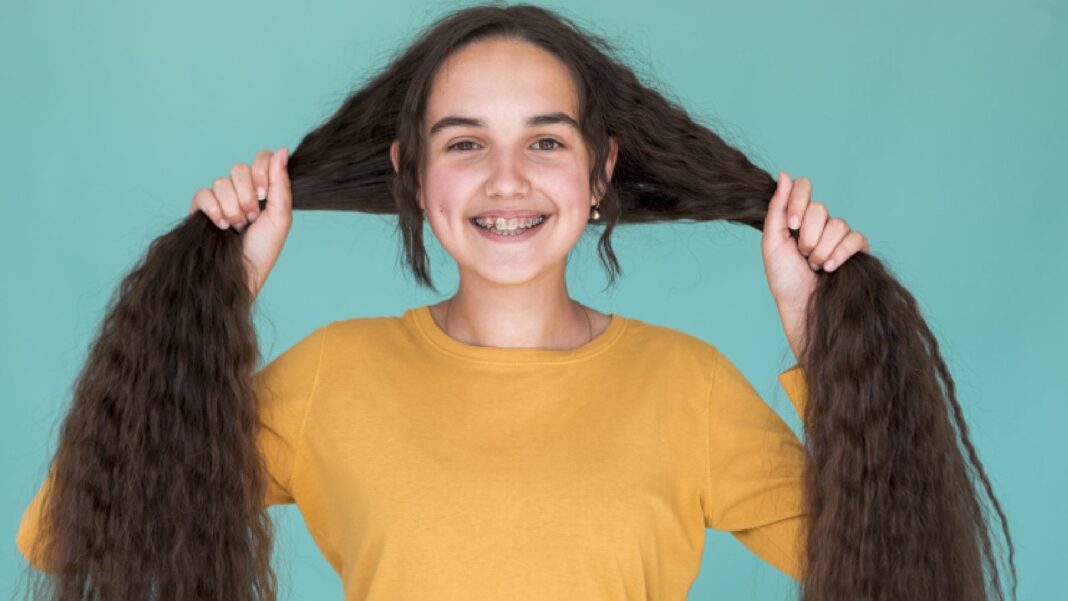Looking for ways to increase your hair volume? Peptides, which are short strings of amino acids, may help. Let’s find out if you should use peptides for hair growth or not.
Peptides, which are small chains of amino acids, are popular in skincare products, as they can help in getting firmer skin and even skin tone. They can also be a part of your haircare routine, especially if hair loss is a problem you are dealing with. Peptides can give a boost to collagen and elastin production – two types of connective tissues that play important roles in smooth and firm skin. They also help in increasing blood circulation to the hair follicles, making them beneficial for your tresses. That’s why you should use peptides for hair growth! But what are the best peptides for hair growth
What are peptides?
Peptides or glycyl-L-histidyl-L-lysine (GHK) are basically short chains of approximately 2 to 50 amino acids, which are the “building blocks” of proteins. They are used in dietary supplements, as they play a large role in fighting off infections and wound healing, according to research published in StatPearls in 2023. They can also be used topically, as there are benefits of using peptides for skin.

When it comes to hair, they have the capacity for signaling the body to produce keratin, which is the structural protein of the hair matrix. “They help to strengthen the hair shaft and hair strands,” says dermatologist Dr Vaishnavee Gulhane. Having oral supplements with peptides may help in reducing the excessive hair shedding and thinning associated with patterned hair loss, as per research published in the Journal of Functional Foods in May 2024.
Best peptides for hair growth
Here are some of the peptides you can use for hair growth –
1. Copper peptides
Copper peptides have the mineral copper, and are often used in hair care products. Copper peptides can help in alleviating hair loss in androgenetic alopecia (a common form of hair loss in both men and women) and promote hair growth, as per a study published in the Journal of Drug Delivery Science and Technology in 2022. They boost the production of collagen and elastin, essential to maintain strong hair.
2. Keratin peptides
Keratin-based peptide was found to be a promising strengthening agent for hair during a study published in the International Journal of Cosmetic Science in 2012.
This type of peptide may also prevent hair breakage.
3. Biotin peptides
During a 2017 review published in Skin Appendage Disorders, biotin was found to be beneficial for people who experienced hair loss due to biotin deficiency. Biotin peptides include biotin, an important B vitamin that may help promote hair growth.
How do peptides help with hair growth?
Peptides are known for their crucial role in promoting hair health. Here’s how:
1. Hair follicle stimulation
“For both hair and scalp health, the body needs two proteins – collagen and elastin, the production of which is enhanced by peptides, mainly copper peptides or GHK-Cu,” says Dr Gulhane. These peptides function as a great way to prolong the hair growth phase, also known as anagen phase, and so, improve hair density.
2. Blood circulation improvement
For hair follicles to receive more oxygen and nutrients, peptides help to increase the blood circulation to the scalp area. This way they help to increase hair growth by nourishing the hair follicles.
3. Blocking DHT (dihydrotestosterone)
“There is a link between a hormone, dihydrotestosterone or DHT and hair loss problem in men and women,” says the expert. This hormone shrinks the hair follicles and causes hair thinning. But peptides aid in blocking DHT and so, prevent hair loss.
4. Inflammation reduction
Inflammation of the scalp can lead to hair loss, something that the anti-inflammatory role of peptides can stop. In fact, they aid in soothing the scalp and reducing redness.
“Peptides also keep the hair hydrated and prevent dryness and scalp flakiness,” says the expert.
Are copper peptides better than minoxidil for hair growth?
Minoxidil is often used to help stop hair loss. “It is a hair loss treatment that promotes blood flow to a person’s hair follicles,” says the expert. But a 2023 study published in Bioactive Materials found that copper peptides promote hair growth with minimal side effects in comparison to minoxidil, which affects the cardiovascular system.
“Though minoxidil is effective as a hair loss treatment, it can also cause irritation of the scalp, dryness and flaking. Despite mild sensitivity, copper peptides are usually well tolerated,” says the expert.
How to use peptides for hair?
There are shampoos, and conditioners with peptides, but they are mostly used in serums.
- Apply a few drops of the serum with peptides to your scalp.
- Gently massage it well in your hair with your fingertips.
- Let it stay on your hair, so do not rinse it off after applying it.

Some peptides can be used daily while others a few times a week. Gentle peptides formulation can be used daily such as leave-in serums. More concentrated products of peptide like shampoo and conditioner are designed to be used less frequently such as 2 to 3 times a week,” says the expert. Intensive peptide treatments like hair masks require weekly use, as they are more powerful for daily use.
What are the side effects of using peptides for hair growth?
While using copper peptides for hair growth, one may experience –
- Copper toxicity, which has symptoms like anemia, and burning sensation, but this is rare.
- People may allergic reactions to peptides, and end up with redness and itchiness.
- People who have underlying scalp conditions such as eczema, psoriasis or dermatitis should refrain from peptide usage, as they can turn out to be potential irritants.
Peptides, especially copper peptides, may help with hair growth. They are available in the form of shampoos, conditioners and serums. But read the labels properly, as some may be for daily use and others for just a few times a week.









